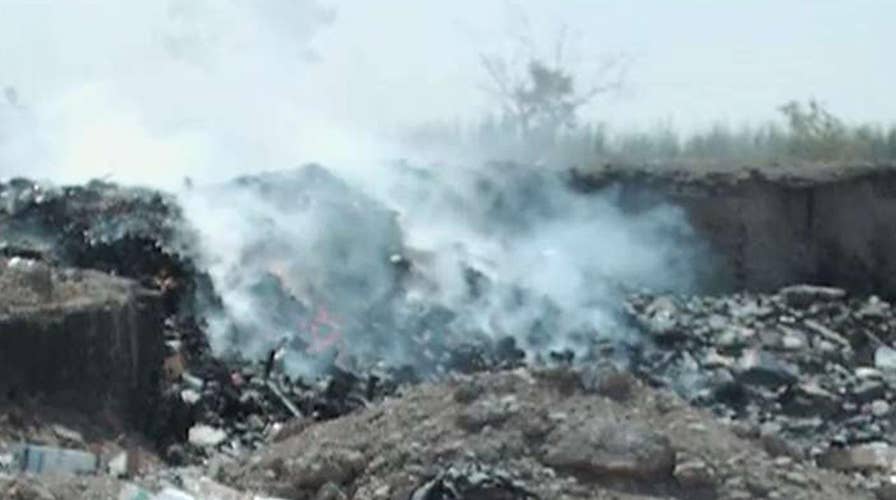Veterans worried about effects from burn pits
Fumes from burn pits in Iraq and Afghanistan may have caused illness. Lea Gabrielle has the story.
Scores of U.S. military veterans put their lives in certain danger countless times in places like Iraq and Afghanistan.
They were on the frontlines of battle, but their struggle didn't end when they returned home.
Tens of thousands of veterans believe their health has been compromised by the polluting smoke expelled from burn pits on their bases. In these pits, all manner of trash, medical waste, and industrial chemicals were set ablaze for disposal.
The burn pit method was originally a temporary measure during the wars in both Iraq and Afghanistan as a way to quickly dispose of waste and garbage on military installations. The vets claim their prolonged exposure to toxic air left tens of thousands of them, as well as private contractors, with a myriad of illnesses including various forms of cancer and severe respiratory issues. Many died after succumbing to their illness, but nearly all who fear they got sick from exposure to burn pits never received proper help from the country they went to war to defend.
A registry was created by the Veterans Administration in 2011, but signing it does not guarantee any form of assistance. Service members and their families concerned with the effects of burn pit exposure say that they struggle to keep up with the high cost of medical treatments. There are more than 140,000 names signed to the VA registry.
In the midst of continuing coverage by Fox News on burn pit exposure at military bases across Iraq and Afghanistan, scores of service members and their families have responded on social media with strong reaction after seeing reporting on the lack of help and assistance made available to them by the VA as well as the lack of prevention during the wars themselves.
Here are just a few of the stories of those coping with what has been called by some: “the new Agent Orange.”
__________________________
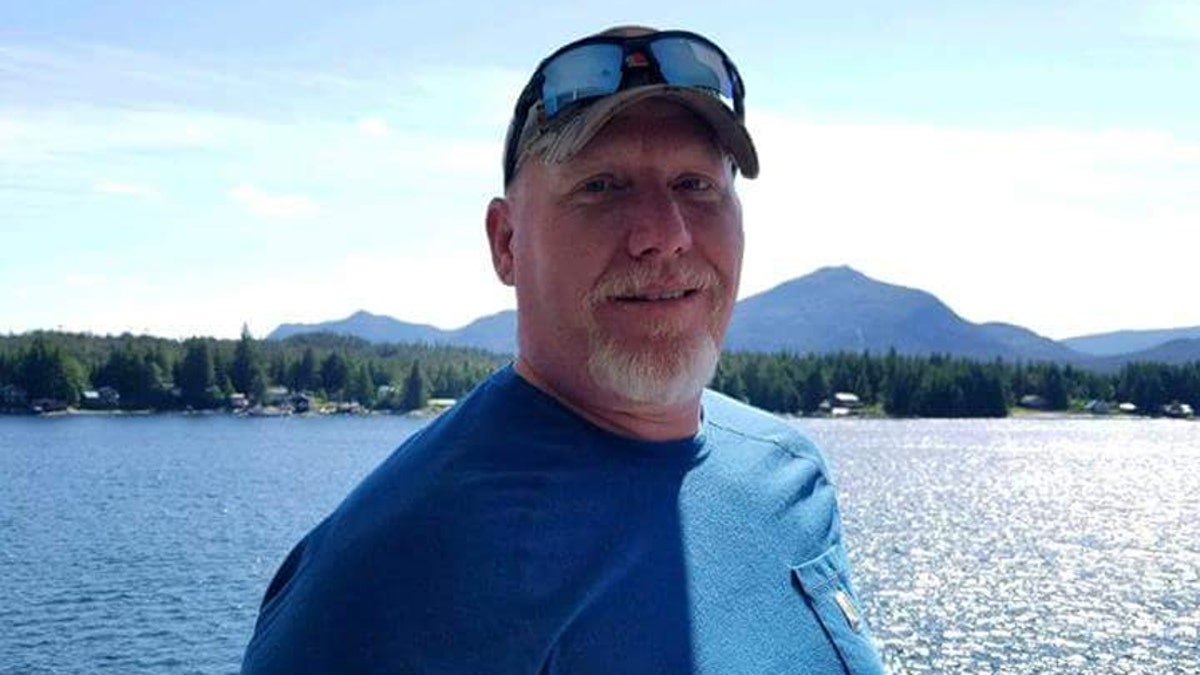
Jason Arnold was a Grenadier with the U.S. Army National Guard when he first went to Iraq in 2003. (Jason Arnold)
Jason Arnold was a Grenadier with the U.S. Army National Guard when he first went to Iraq in 2003 and while he was not stationed on a particular Forward Operating Base (FOB) he often spent time on many of them as he worked security details with private contractor convoys from Kuwait to Iraq.
It was during those missions that he was often exposed to the heavy smoke conditions of burn pits. He clearly remembers how it hung thick in the air.
“We would have shifts in the wind and that smoke would roll in,” Arnold tells Fox News. “In the morning it was the worst.”
The veteran had previous experience as a paramedic before he enlisted which led him to work as a medic while on his tour and says that at the time, he and other soldiers worried there was a danger behind the exposure to the heavy smoke.
But their concerns were never addressed while in the war zone.
“When we were there, no one was saying anything,” he recalls. “If you suck in campfire smoke, you can damage your lungs. Imagine what happens when you burn all those hazardous materials.”
“We knew it was bad, but if you’re given an order, you do it.”
One of the private contractors that his unit worked with, Kellogg, Brown, and Root (KBR) — formally known as Halliburton — has been accused in numerous lawsuits of using the controversial waste disposal method on bases they operated after safer methods, like incinerators, were suggested.
A statement from the contractor reads in part: "KBR has consistently stated, KBR operated burn pits at a very limited number of bases in Iraq and Afghanistan and KBR personnel operated safely and effectively at the direction and under the control of the U.S. military."
Arnold and his unit often assisted KBR workers with disposing of trash into burn pits.
“You would load up a Humvee and help toss garbage out,” he said. “Every time we went out, they would just hand out those cheap, paper filter masks. We knew it was bad, but if you’re given an order, you do it.”
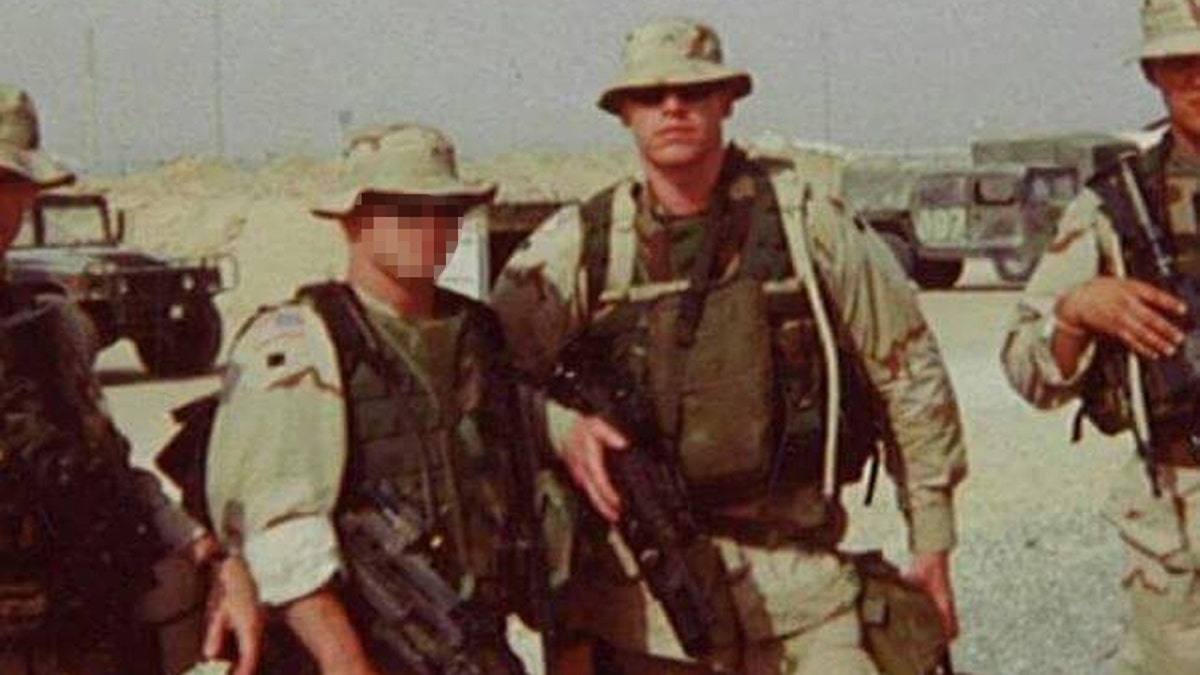
Arnold often spent time working security details with private contractor convoys from Kuwait to Iraq. It was during those missions that he was often exposed to the heavy smoke conditions of burn pits. He clearly remembers how it hung thick in the air. (Jason Arnold)
Arnold returned home after his second tour in 2004 and says that it was not long after that he started seeing symptoms.
“I got back to the States and the next thing I knew, I was out of breath. I had trouble breathing,” he says.
Arnold went to see numerous doctors who discovered that he had numerous respiratory ailments
“They all asked me if I was a smoker,” he says. “I have COPD [chronic obstructive pulmonary disease] and I never smoked a day in my life. I have Sleep Apnea. Every year it gets worse and worse.”
Arnold, like many vets in his position, signed up for the Veteran Administration’s burn pit registry in the hopes that he would get assistance with medical coverage and treatment. Like many others, he did not.
“The VA has never rated any of us,” the Veteran says. “They never point out the fact that we were exposed.”
He adds that he’s often bumped off the registry and has to resign. He also says that he receives nearly no compensation from the VA.
“I’m only allowed three inhalers every month,” Arnold says, “but I need it non-stop. I carry them everywhere with me. If I run out, I have to wait for months because the VA is so backlogged.”
Arnold says that he believes the VA system to be flawed and that we as a country owe it to every single veteran to provide better assistance.
“We all went in perfectly healthy and came back with breathing issues or worse,” he says. “It wasn’t our fault. We went and did our job.”
“They use you, kill you and just throw you to the side.”
___________________________
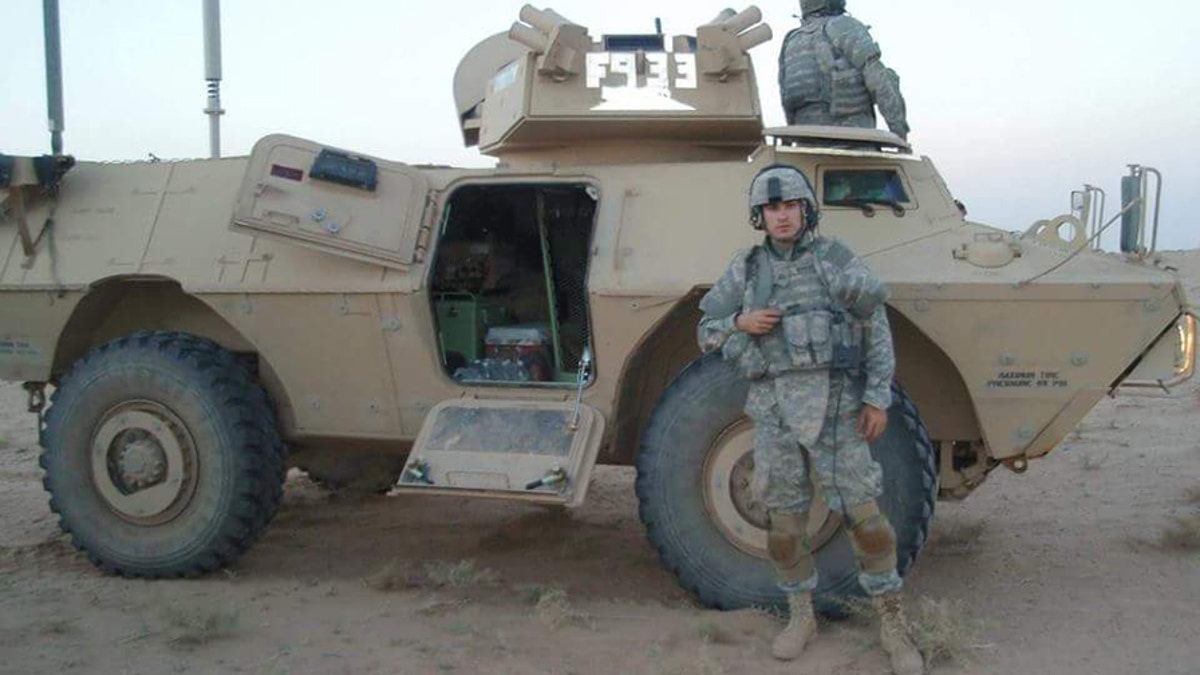
Hank Burns, an E4 specialist for the U.S. Army, who had two active tours of duty. He noticed his breathing issues during the second tour. (Hank Burns)
Hank Burns was an E4 specialist for the U.S. Army when he began a 15-month deployment in Northern Iraq back in 2007. He served another 13 month tour and left active duty in August of 2011. He tells Fox News he noticed his breathing issues during that second tour of duty.
“I worked right next to those pits,” Burns tells Fox News. “I noticed it while I was still there. I would be walking and you get short of breath all of a sudden. I would suddenly get dizzy.”
“You can smell it every day that you are there. It’s heavy. It smells toxic.”
Burns says that his health issues continued long after he returned home.
“What I’ve noticed is that I still have a lot of breathing issues,” he says. “I’ll be sleeping and wake up. I’m fighting just to breathe.”
“Even just walking, I’ll get winded and have to stop. These are problems I never had before.”
“It’s nothing more than a list. It’s a starting and stopping point all at once. We come home and we are left to be thrown at the wolves.”
Burns said it was years before he knew that the VA’s registry was available to veterans like him.
“I didn’t even know it existed,” he says. “I had to hear about it through another vet who stumbled across it.”
“I shouldn’t have to depend on another soldier that found it by accident.”
Burns says he signed up for the registry but wasn’t sure what to do after that.
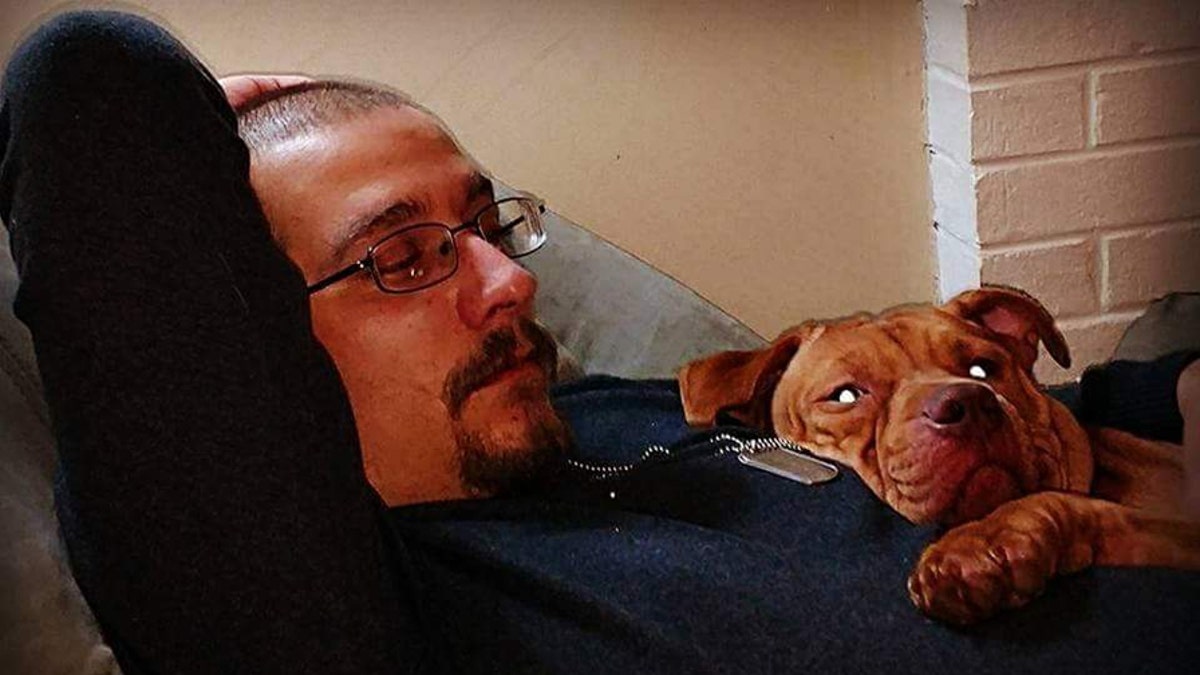
Burns said it was years before he knew that the VA’s registry was available to veterans like him. (Hank Burns)
“It’s nothing more than a list,” he says. “It’s a starting and stopping point all at once. We come home and we are left to be thrown at the wolves.”
The veteran also was troubled by recent reports on Fox News that bits are still being used near military bases in Iraq and Afghanistan.
“It’s terrible,” Burns says. “I could see if this was a new war, but we’ve been there for so many years that’s there’s no reason to still use these methods.”
“It’s a shame that we are having soldiers still exposed.”
___________________________
Many of the burn pits were shut down on U.S. bases in Iraq when former Air Force Sergeant Jeremy Kitzhaber arrived at Balad AFB in 2011, but he still felt the effects of the pollution caused by them.
“I was told when I got there that there was still a lot of contamination,” Kitzhaber tells Fox News, who started feeling ill in 2013, nearly a year after retiring from the Air Force.
“I started experiencing strange symptoms,” he says. “I had some weird, tender feelings in my abdomen.”
Kitzhaber went to see his doctor and it was after a CT scam that he was immediately admitted to the Emergency Room when he was discovered to have a rare form of stage 4 appendix cancer.
“It had disintegrated,” he says adding that the cancer had spread and numerous chemo treatments did nothing to cure him. He was diagnosed with Pseudomyxoma Peritonei (PMP), which covered his entire diaphragm, intestines, bladder, stomach, and rectum. His abdominal wall and liver were also affected.
“It all came down to Iraq,” he says believing that the toxins released into the air from burn pits contaminated the ground and eventually made him sick.
“Originally, I put in a request and they denied it. It took me calling my state senator to get them to expedite my claim.”
“To be fair, I was exposed to numerous dust storms,” he recalls. “I remember choking on the air. I would wake up and the sky would be orange.”
“You could not escape the dust.”
Kitzhaber filed a claim with the VA, but he says that it took 400 days, over one year to rule that his cancer was connected to his time in service.
“Originally, I put in a request and they denied it,” he says. “It took me calling my state senator to get them to expedite my claim.”
He, like many other vets in similar positions, believes that the Department of Defense needs to concede to what service members were exposed to in Iraq.
“The DoD needs to acknowledge that they unnecessarily exposed people to dangerous carcinogens,” he says. “They say there’s no direct cause because if they admit it, they’ll have more claims against them and they won’t be able to pay.”
___________________________
Also with the Air Force, Technical Sergeant David J. Robinson was first deployed to Iraq in 2003, but it wasn’t until nearly a decade later when here turned to his home in Colorado Springs that he started to experience problems breathing.
“I thought I was having an immediate problem with the altitude,” he says. “It was easy to blame it on something else because who wants to admit it’s something serious?”
But soon after, Robinson started experiencing other symptoms. Once blood was found in his urine a few months later, his doctor ordered tests and it was discovered that he had a large mass in his abdomen.
“You trusted your leadership to look after you.”
“It was a roller coaster of learning what it was,” he says of the cancer that had ravaged his body.
In 2015 Robinson underwent a more than 10 hour surgery. His appendix, bladder, and portions of his intestine were removed.
“They couldn’t salvage anything,” Robinson says.
During his service, Robinson had often assisted in disposing of waste in the burn pits of his base.
“Two to three times a week, we would load up pickup trucks,” he recalls. “Anything and everything that had to be thrown away…it was all brought to burn pits.”
“It was part of the mission. It was mostly about getting the job done. It was just the way it was.”
Robinson says that many service members at the time, including himself, were not grasping the concept of the dangers behind the burning.
“You trusted your leadership to look after you.”
Robinson finds the treatment of most veterans to be frustrating.
“It’s almost like we are being brushed aside or swept under the carpet.”








































